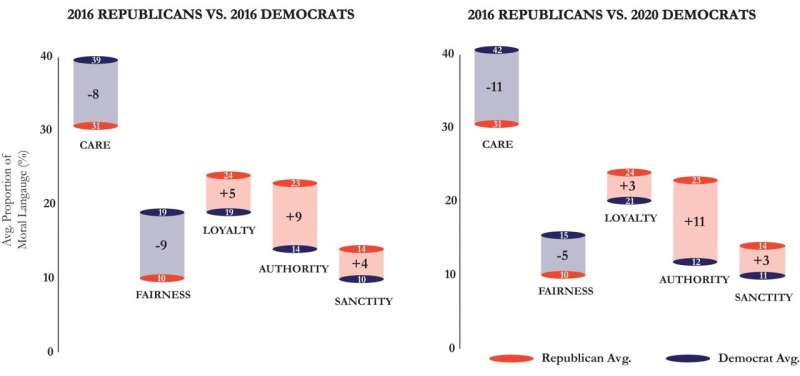Democratic and Republican presidential campaigns use fundamentally different moral rhetoric, study finds
New research from Professor Manos Tsakiris, from the Department of Psychology reveals how candidates in U.S. presidential primary elections use distinct moral rhetoric on social media to appeal to voters.
New research led by researchers at the Center for the Politics of Feelings and published in PNAS Nexus, the differences in moral rhetoric used by Republicans and Democrats were so extreme that the researchers were able to identify the party of 34 candidates who ran in the 2016 and 2020 U.S. Presidential primaries solely by mapping their moral language from Twitter.
This new way of mapping moral rhetoric revealed candidates’ party affiliations and highlighted instances where individuals like Donald Trump set themselves apart from their fellow primary contenders, as was the case in 2016.
The study, led by Kobi Hackenburg, a Ph.D. student at the University of Oxford and lab-led by Professor Manos Tsakiris from Royal Holloway, University of London, was carried out in partnership with Professor William J. Brady at Northwestern University.
Professor Manos Tsakiris, Professor of Psychology at Royal Holloway, University of London, said, “These patterns of moral expression reveal another dimension of polarization in the US. We illustrate a meaningful divergence in discourse between candidates and parties, and this has major implications for the ways voters engage with campaign messaging, respond to campaign issues, and form opinions about political candidates.”
With the 2024 U.S. presidential primary season approaching, the research provides fresh insight into the underlying significance of political messaging. When appealing to their respective bases, candidates employ distinct moral frameworks associated with their party affiliations.
This consistent divergence in moral perspective has served as a defining characteristic in the electoral landscape of American presidential campaigns in both 2016 and 2020.
With the Republican Party already embroiled in a primary battle, this study holds immense value in helping voters and political analysts understand the intricate moral and rhetorical dynamics shaping a fragmented and expansive national debate.
More information:
Kobi Hackenburg et al, Mapping moral language on US presidential primary campaigns reveals rhetorical networks of political division and unity, PNAS Nexus (2023). DOI: 10.1093/pnasnexus/pgad189
Citation:
Democratic and Republican presidential campaigns use fundamentally different moral rhetoric, study finds (2023, July 14)
retrieved 14 July 2023
from https://phys.org/news/2023-07-democratic-republican-presidential-campaigns-fundamentally.html
This document is subject to copyright. Apart from any fair dealing for the purpose of private study or research, no
part may be reproduced without the written permission. The content is provided for information purposes only.

New research from Professor Manos Tsakiris, from the Department of Psychology reveals how candidates in U.S. presidential primary elections use distinct moral rhetoric on social media to appeal to voters.
New research led by researchers at the Center for the Politics of Feelings and published in PNAS Nexus, the differences in moral rhetoric used by Republicans and Democrats were so extreme that the researchers were able to identify the party of 34 candidates who ran in the 2016 and 2020 U.S. Presidential primaries solely by mapping their moral language from Twitter.
This new way of mapping moral rhetoric revealed candidates’ party affiliations and highlighted instances where individuals like Donald Trump set themselves apart from their fellow primary contenders, as was the case in 2016.
The study, led by Kobi Hackenburg, a Ph.D. student at the University of Oxford and lab-led by Professor Manos Tsakiris from Royal Holloway, University of London, was carried out in partnership with Professor William J. Brady at Northwestern University.
Professor Manos Tsakiris, Professor of Psychology at Royal Holloway, University of London, said, “These patterns of moral expression reveal another dimension of polarization in the US. We illustrate a meaningful divergence in discourse between candidates and parties, and this has major implications for the ways voters engage with campaign messaging, respond to campaign issues, and form opinions about political candidates.”
With the 2024 U.S. presidential primary season approaching, the research provides fresh insight into the underlying significance of political messaging. When appealing to their respective bases, candidates employ distinct moral frameworks associated with their party affiliations.
This consistent divergence in moral perspective has served as a defining characteristic in the electoral landscape of American presidential campaigns in both 2016 and 2020.
With the Republican Party already embroiled in a primary battle, this study holds immense value in helping voters and political analysts understand the intricate moral and rhetorical dynamics shaping a fragmented and expansive national debate.
More information:
Kobi Hackenburg et al, Mapping moral language on US presidential primary campaigns reveals rhetorical networks of political division and unity, PNAS Nexus (2023). DOI: 10.1093/pnasnexus/pgad189
Citation:
Democratic and Republican presidential campaigns use fundamentally different moral rhetoric, study finds (2023, July 14)
retrieved 14 July 2023
from https://phys.org/news/2023-07-democratic-republican-presidential-campaigns-fundamentally.html
This document is subject to copyright. Apart from any fair dealing for the purpose of private study or research, no
part may be reproduced without the written permission. The content is provided for information purposes only.
